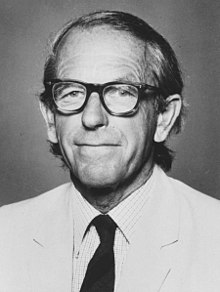
Back Frederick Sanger AF فردريك سانغر Arabic فردريك سانجر ARZ Frederick Sanger AST Frederik Senger AZ فردریک سنقر AZB Фрэдэрык Сенгер BE Фредерик Сангър Bulgarian ফ্রেডরিক স্যাঙ্গার Bengali/Bangla Frederick Sanger BS
Frederick Sanger | |
|---|---|
 | |
| Born | 13 August 1918 |
| Died | 19 November 2013 (aged 95) |
| Nationality | British |
| Alma mater | University of Cambridge (PhD) |
| Known for | Amino acid sequence of insulin Sanger sequencing Sanger Centre |
| Awards |
|
| Scientific career | |
| Fields | Biochemistry |
| Institutions | |
| Thesis | The metabolism of the amino acid lysine in the animal body (1943) |
| Doctoral advisor | Albert Neuberger[2] |
| Doctoral students | |
Frederick Sanger OM CH CBE FRS FAA (/ˈsæŋər/; 13 August 1918 – 19 November 2013) was an English biochemist.
Sanger is a two-time Nobel laureate in chemistry, the only person to have been so. Sanger is the fourth person to have been given two Nobel Prizes, either individually or in tandem with others.[Note 1]
In 1958 he was given a Nobel prize in chemistry "for his work on the structure of proteins, especially that of insulin".
In 1980, Walter Gilbert and Sanger shared half of the chemistry prize "for their contributions concerning the determination of base sequences in nucleic acids". The other half was given to Paul Berg "for his fundamental studies of the biochemistry of nucleic acids, with particular regard to recombinant-DNA".
- ↑ "Seven days: 22–28 November 2013". Nature. 503 (7477): 442–443. 2013. Bibcode:2013Natur.503..442.. doi:10.1038/503442a. S2CID 4465323.
- ↑ Allen, A.K.; Muir, H.M. (2001). "Albert Neuberger. 15 April 1908 – 14 August 1996". Biographical Memoirs of Fellows of the Royal Society. 47: 369–382. doi:10.1098/rsbm.2001.0021. JSTOR 770373. PMID 15124648. S2CID 72943723.
- ↑ Brownlee, George G. (2015). "Frederick Sanger CBE CH OM. 13 August 1918 – 19 November 2013". Biographical Memoirs of Fellows of the Royal Society. 61: 437–466. doi:10.1098/rsbm.2015.0013. S2CID 86297413.
<ref group=Note> tags on this page, but the references will not show without a {{reflist|group=Note}} template (see the help page).